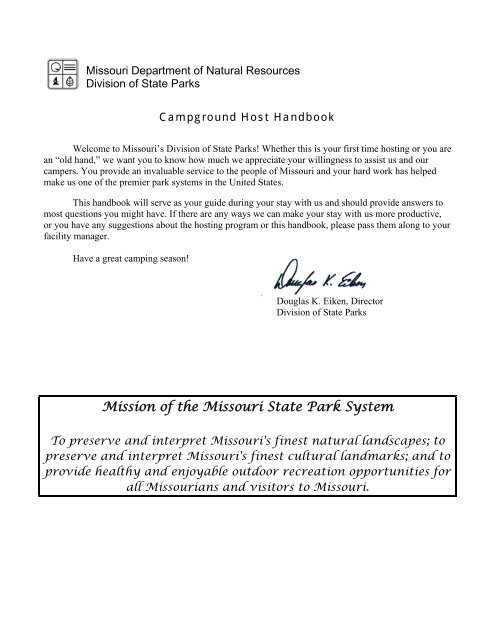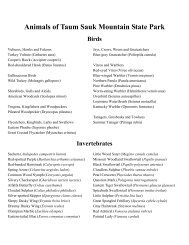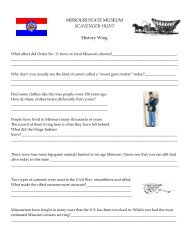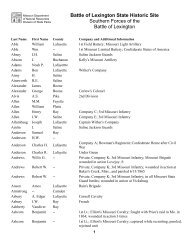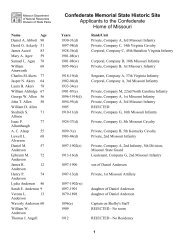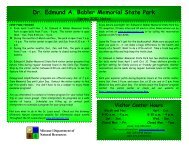Campground Host Handbook - Missouri State Parks
Campground Host Handbook - Missouri State Parks
Campground Host Handbook - Missouri State Parks
You also want an ePaper? Increase the reach of your titles
YUMPU automatically turns print PDFs into web optimized ePapers that Google loves.
<strong>Missouri</strong> Department of Natural ResourcesDivision of <strong>State</strong> <strong>Parks</strong><strong>Campground</strong> <strong>Host</strong> <strong>Handbook</strong>Welcome to <strong>Missouri</strong>’s Division of <strong>State</strong> <strong>Parks</strong>! Whether this is your first time hosting or you arean “old hand,” we want you to know how much we appreciate your willingness to assist us and ourcampers. You provide an invaluable service to the people of <strong>Missouri</strong> and your hard work has helpedmake us one of the premier park systems in the United <strong>State</strong>s.This handbook will serve as your guide during your stay with us and should provide answers tomost questions you might have. If there are any ways we can make your stay with us more productive,or you have any suggestions about the hosting program or this handbook, please pass them along to yourfacility manager.Have a great camping season!Douglas K. Eiken, DirectorDivision of <strong>State</strong> <strong>Parks</strong>Mission of the <strong>Missouri</strong> <strong>State</strong> Park SystemTo preserve and interpret <strong>Missouri</strong>'s finest natural landscapes; topreserve and interpret <strong>Missouri</strong>'s finest cultural landmarks; and toprovide healthy and enjoyable outdoor recreation opportunities forall <strong>Missouri</strong>ans and visitors to <strong>Missouri</strong>.
<strong>Campground</strong> <strong>Host</strong> <strong>Handbook</strong>Page 2 of 12Table of ContentsI. The <strong>Campground</strong> <strong>Host</strong> Program..............................................Page 3II. The VIP Program.....................................................................Page 3III. Facilities Participating in the <strong>Host</strong> Program............................Page 4IV. The Role of the <strong>Campground</strong> <strong>Host</strong>..........................................Page 5V. Risk Management....................................................................Page 6VI. Potential Conflicts ...................................................................Page 8VII. General Duties and Responsibilities........................................Page 9VIII. Compensation..........................................................................Page 10IX. Your Comments and Opinions................................................Page 11X. Contact Us ...............................................................................Page 11XI. Index........................................................................................Page 12Revised 1/14/2008
<strong>Campground</strong> <strong>Host</strong> <strong>Handbook</strong>Page 3 of 12I. The <strong>Campground</strong> <strong>Host</strong> ProgramThe <strong>Campground</strong> <strong>Host</strong> Program is a volunteer program in which a host or host couple servesapproximately forty hours per week in return for the use of a campsite. A host works under thesupervision of a Natural Resource Manager or a Park/Site Specialist, or under his or her assignedrepresentative. In this capacity, the host is subject to many of the same work rules and requirements asother personnel at the facility. Some of these rules are discussed under “The Role of the <strong>Campground</strong><strong>Host</strong>.”The <strong>Host</strong> Program is in effect in most of the forty state parks and historic sites that havecampgrounds. Dates available for hosting generally run from April through October, though this canvary from facility to facility and may be somewhat weather dependent. <strong>Host</strong>s are encouraged to serve aminimum of one month in a given facility, while the maximum service allowed in any one facilityduring a year is six months.There are circumstances where a host can serve a facility for less than one month. However, thishas become fairly uncommon as it can take a fair amount of staff time to train and orient a campgroundhost, and by the time they are comfortable in their duties, it’s time to move on.We have couples that serve as hosts and we have individuals also. There is no requirement orexpectation on our part either way. Often a hosting couple will split duties between them, though just asoften one partner will do all or most of the work while the other enjoys the facility. While the job ofhosting is not very strenuous by nature, you should be aware that it can often require extended hours andsome walking over uneven terrain and long distances.Many of our hosts serve at more than one facility over the course of a year. This win-winsituation gives them a chance to enjoy the great variety in our park system, and it gives the facilitiesexperienced hosts that carry their enthusiasm longer through the season.II. The VIP ProgramWhile one of the most visible means of volunteering in state parks and sites, the <strong>Campground</strong><strong>Host</strong> Program is only one portion of our volunteer program. The Volunteers in <strong>Parks</strong> (VIP) Programprovides invaluable assistance to the Division of <strong>State</strong> <strong>Parks</strong> on a wide variety of tasks and projectsaround the state.Volunteers assist people in visitor centers and contact stations. They help catalog historic itemsand documents and they serve as natural history interpreters and tour guides. Some VIPs performmaintenance or light construction tasks, or help with constructing or renovating trails. There is almost nolimit to the types of work that volunteers can perform. The main requirement is a willingness to serve.Revised 1/14/2008
<strong>Campground</strong> <strong>Host</strong> <strong>Handbook</strong>Page 4 of 12III. Facilities Participating in the <strong>Host</strong> ProgramArrow Rock <strong>State</strong> Historic SiteDr. Edmund A. Babler Memorial <strong>State</strong> ParkSam A. Baker <strong>State</strong> ParkBattle of Athens <strong>State</strong> Historic SiteBennett Spring <strong>State</strong> ParkBig Lake <strong>State</strong> ParkCrowder <strong>State</strong> ParkCuivre River <strong>State</strong> ParkFinger Lakes <strong>State</strong> ParkGraham Cave <strong>State</strong> ParkHawn <strong>State</strong> ParkJohnson’s Shut-Ins <strong>State</strong> Park *Knob Noster <strong>State</strong> ParkLake of the Ozarks <strong>State</strong> ParkLake Wappapello <strong>State</strong> ParkLewis and Clark <strong>State</strong> ParkLong Branch <strong>State</strong> ParkMeramec <strong>State</strong> ParkMontauk <strong>State</strong> Park(* No host opportunities in 2008 due to construction.)Onondaga Cave <strong>State</strong> ParkPershing <strong>State</strong> ParkPomme de Terre <strong>State</strong> ParkRoaring River <strong>State</strong> ParkRobertsville <strong>State</strong> ParkSt. Francois <strong>State</strong> ParkSt. Joe <strong>State</strong> ParkStockton <strong>State</strong> ParkTable Rock <strong>State</strong> ParkThousand Hills <strong>State</strong> ParkTrail of Tears <strong>State</strong> ParkHarry S Truman <strong>State</strong> ParkMark Twain <strong>State</strong> ParkVan Meter <strong>State</strong> ParkWakonda <strong>State</strong> ParkWallace <strong>State</strong> ParkWashington <strong>State</strong> ParkWatkins Woolen Mill <strong>State</strong> Park and HistoricSiteWeston Bend <strong>State</strong> ParkRevised 1/14/2008
<strong>Campground</strong> <strong>Host</strong> <strong>Handbook</strong>Page 5 of 12IV. The Role of the <strong>Campground</strong> <strong>Host</strong>As an ‘Employee’ of the <strong>State</strong> of <strong>Missouri</strong>While the Division of <strong>State</strong> <strong>Parks</strong> appreciates the fact that you are volunteering your precious time to us,it is also extremely important that we realize how the rest of the world views the relationship we have.When you are performing your duties as host, our visitors and campers perceive you to be a stateemployee. Because of this, you must abide by many or most of the same codes and rules as park and siteemployees. These include:• The state’s code of ethics prohibits employees from accepting gratuities or gifts of any kind.What this means: You are not allowed to accept money or any type of gift (food or any items ofvalue) during the performance of your duties. (This includes any gratuities offered by thepark/site concessionaire.) On the flip side of this, it is likewise inappropriate for you to offergifts or gratuities to other employees.• <strong>State</strong> employees are prohibited from discriminating against or showing favoritism toward anyone onthe basis of race, color, religion, sex, age, or physical disability. <strong>State</strong> employees are prohibited fromsexual harassment.What this means: All of our visitors and coworkers are to be treated with respect and courtesy.These policies are based on federal and state laws and will be enforced.• Consumption of alcohol and/or controlled substances while on duty is prohibited.What this means: Except for prescription medications, you are not allowed to drink or take drugswhile on duty as host. Please keep in mind that even when you are off duty, that you representthe state during your stay and the impression you give our visitors reflects on all of us.• Employees shall maintain a neat appearance and maintain their workplace in a clean and orderlyfashion.What this means: Since you represent the <strong>State</strong> of <strong>Missouri</strong> to many of our visitors, it is veryimportant that you are dressed and groomed appropriately. You will be issued a campgroundhost ID and some facilities may provide you with uniform items that identify you as host.Whether or not you have a uniform, your clothing must be clean, appropriate to the season, andappropriate for greeting the public. IDs should be worn at all times when you are on duty.Beyond personal appearance, your workplace also reflects on you as a state employee. Foralmost all hosts, the workplace is their RV or camper, along with the campsite they occupy.Please make sure your site is well groomed, is free of trash, etc. “Personal touches” such asplaques with your name, windchimes, etc., are allowed, but we prohibit placement of skirting orfencing around the camper or site during the summer months or on-season. Skirting is allowedonly during cold-weather months and only with permission of the facility manager.Revised 1/14/2008
<strong>Campground</strong> <strong>Host</strong> <strong>Handbook</strong>Page 7 of 12• All injuries to visitors and employees must be reported immediately.What this means: To ensure the safety of our visitors and employees it is vital that we have arecord any time someone is injured at one of our facilities. Generally, it will be sufficient tonotify the Park Ranger or facility manager as soon as you become aware of someone being hurt.Get as much information as you can and if necessary refer the person to the nearest medicalfacility. Information on local medical facilities will be provided to you during orientation. Staffmembers should refrain from offering medical advice and seek assistance as quickly as possible.• An employee injured on the job may be eligible to certain benefits.What this means: If you are injured while performing your duties as a host, workmen’scompensation laws should cover you. It is critical, however, that you notify the facility manageras quickly as possible in the event of such injury to make sure that the appropriate people arenotified. Injuries that occur during your off duty hours will not be covered.• Understand the task being assigned.What this means: Most accidents occur due to improper training or failure to use appropriatepersonal protection equipment (PPE). No staff member should undertake an assignment or taskthat they have not been sufficiently trained to perform. Before undertaking an assignment ortask, make sure that you understand the assignment or task. If the assignment/task involves theuse of any type of equipment, request that a fulltime member of the park staff provide you withthe proper training on the proper usage of the piece of equipment. In addition, you shouldreceive the appropriate personal protection equipment for the piece of equipment being used.Examples of personal protection equipment are:Goggles/Eye Protection Hard HatGlovesEar PlugsChainsaw ChapsHigh Visibility Safety Vest• Automobile AccidentsWhat this means: <strong>State</strong> vehicles should only be operated while conducting business for the stateof <strong>Missouri</strong>. As a state agency, we self insure our vehicles against accidents with others. In theevent of an automobile accident, it is important to remember that the Office of Administration-Risk Management Section and/or the Attorney Generals Office is responsible for determiningfault and negotiation any claim settlement as a result of an accident. Staff members shouldrefrain from discussing any issue of fault for an accident.All staff members involved in an automobile accident are required to contact the nearest lawenforcement agency or the <strong>Missouri</strong> <strong>State</strong> Highway Patrol for an accident report. Staffmember(s) involved in an accident should not leave the scene of the accident until a report hasbeen made with a law enforcement official. The accident should be reported to your immediatesupervisor should be contacted as soon as possible.Revised 1/14/2008
<strong>Campground</strong> <strong>Host</strong> <strong>Handbook</strong>Page 8 of 12There is one additional issue related to your role as a state employee that we need to coverand that is legal liability in the use of personal vehicles and equipment. Because of your rather uniqueworking relationship with the state, some of the lines may seem to be blurred when it comes toseparating personal activities from work activities. This seems to be most true in regard to using yourpersonal property while conducting state business.One place where making a distinction between personal use and state use is most critical isthe liability issue. What happens, for example, if you are driving your personal vehicle or golf cartthrough the campground and accidentally hit another vehicle? The answer depends entirely on whetheror not you are on duty and performing activities related to your job. If you are pulling expired permits orare out collecting fees in your personal vehicle, then you are functioning as an employee and the statewill provide liability coverage for damage caused to the other individual’s property. Any damage to yourproperty will be covered by your personal insurance policy. On the other hand, if you just finishedpulling permits and decide to go to town to get some groceries, then you are on your own time and theliability falls back on you and your insurance carrier.A final word on the dos and don’ts of hosting – if you are aware of any other volunteer oremployee violating any of the above-mentioned policies, please notify the facility manager as soon aspossible.As always, if you have questions or concerns about this, please talk them over with thefacility manager or the Volunteer Coordinator.VI. Potential ConflictsAs was stated earlier, you enjoy a rather unique relationship with the <strong>State</strong> of <strong>Missouri</strong>.Being a volunteer affords you many opportunities that other employees don’t often get. Along withthose opportunities, though, come some responsibilities.Once you arrive in your assigned park or historic site, you become a member of a team. Allthe members of that team have their own roles to play and their own responsibilities. While allAmericans still idolize the ‘rugged individualist’ portrayed in our literature and movies, the fact is thatmost worthwhile accomplishments are done through teamwork.There will undoubtedly be times when you disagree with a specific rule or decision thateffects your work as a host or facility operation. You are not only free to discuss your concerns with thefacility manager; you are encouraged to do so. However, except for an instance that clearly violates thelaw or creates an unsafe condition, you are obligated to actively support and carry out stated rules anddecisions. Only if and when such rules or decisions are changed, may you do otherwise.Another potential conflict was alluded to earlier that has to do with unsafe or illegal actions.Though you are a member of the team and considered a state employee in many regards, you are neverunder any obligation to perform any activity that places you or another person in physical danger. Norare you obliged to participate in or condone any activity that is illegal.Revised 1/14/2008
<strong>Campground</strong> <strong>Host</strong> <strong>Handbook</strong>Page 9 of 12Should the unlikely happen and an employee or supervisor asks or orders you do tosomething you believe to be unsafe or illegal, you are to refuse to do so. Bring such an occurrence to theattention of the facility manager or Volunteer Coordinator immediately.VII. General Duties and ResponsibilitiesIt is a general rule of thumb that we expect a host (or a host couple’s combined time) towork forty (40) hours per week. This can vary by season or by how busy the campground is. There willbe days when you put in more than eight hours and days you put in less. It is not our intention tooverwork you, so if you find you are putting in more than forty hours per week please let the facilitymanager know so your schedule or duties can be modified. If you feel you are not finding enough to doto come close to the forty hour standard, we can try to find some additional tasks. However, anyadditional work will either fall within the scope of the duties outlined below or must be approved bydivision management. In any case, your schedule and daily tasks will be coordinated with your facilitymanager. Monthly timesheets are required to document your service and will be provided to you atorientation.The roles and functions fulfilled by campground hosts are nearly as varied as the parks andhistoric sites in which they serve. There are a number of common themes, however, that will give you anidea of what to expect, as well as what is expected of you.Each facility manager will provide you of a specific list of duties upon your arrival. Thoseduties will be similar to what is listed here, though the specifics of how, when, and why may varywidely from facility to facility. The life of a campground host is seldom strenuous, however you shouldinform your facility manager of any physical limitations you might have that could affect your ability toperform any of these tasks. We will do what we can to accommodate your needs within the scope of thejob and our financial abilities.• Visitor Assistance: You will perform this important activity on a daily basis. This service mayinclude handing out brochures, giving directions, helping visitors find an empty campsite,maintaining a current roster or log of campers, and providing other general information. Thisservice also includes informing visitors of minor rule violations, such as having too many vehicleson a site, noise after quiet hours, etc.• Fee Collection: You may be required to collect camping fees, pull expired camping permits, sellfirewood, or collect other miscellaneous fees from campers and other visitors. The types of fees,how, when and where they are collected, and their disposition will be dictated by the needs andlayout of the facility. Each facility manager, however, will provide you with a clear set of writtenguidelines and procedures on how the facility handles revenue. Included in that document will be asecurity plan dealing with how money is to be handled so you do not have large amounts of cash inyour possession at any time.• Light Maintenance: This could include such things as periodic litter pick-up, light cleaning in theshower house and/or replenishing toilet paper in restrooms. All serious maintenance needs shouldbe referred to the facility’s maintenance staff.• Monitor the <strong>Campground</strong>: As with visitor assistance, this duty will be appropriate in all facilities.You will be in a position to see and hear many things that our other employees miss. When thosethings negatively affect our visitors or facility operations, you should pass along any informationRevised 1/14/2008
<strong>Campground</strong> <strong>Host</strong> <strong>Handbook</strong>Page 10 of 12you have to the facility manager, Park Ranger, or other staff member. This could include such thingsas people being noisy after quiet hours, a camper who refuses to pay their fees, a barking dog, orsome other disruption.• Distribute Comment Cards: You may be asked to distribute Guest Comment Cards to campersduring the normal course of your duties. These cards are provided at <strong>Missouri</strong> state park systemfacilities as a mechanism for visitors to share their opinions on our services if they so choose. It isimportant to recognize that you represent the park system in your hosting capacity. Comments madeof your own personal opinion can easily be construed as division policy or opinion by a visitor. Itcan be easy to agree with a complaint or comment from a camper if it is something you personallyagree with as well. Please do your best to stick with factual division rules or policies and allow thecomment card process to serve as the camper's opportunity for bringing issues to the division'sattention.Certain facilities may have other duties for you that don’t fall neatly into one of these fourcategories. These duties will be carefully explained during your orientation. They will also be duties thathave received prior approval from management staff.A special note about monitoring the campground and providing visitor information. One caneasily find him or herself in a position to go beyond what is required or expected when it comes toinforming visitors about our rules. The Division of <strong>State</strong> <strong>Parks</strong> neither expects nor wants you tointentionally or inadvertently assume a role that could put you in jeopardy. We have Natural ResourceManagers and Park/Historic Site Specialists, Park Rangers, and outside law enforcement agencies todeal with unruly persons or those that break the law. We do not want you placed in the position of tryingto handle these people on your own. Our staff members are trained to do so and they have the authorityto handle such incidents.Your responsibility is to inform or remind visitors of the rules whenever it becomes necessary.You are not responsible for enforcing those rules.Along those same lines, unless you have up-to-date training in first aid or CPR, in an emergencyit is generally best to seek assistance as quickly as possible. The primary rule that physicians follow is‘do no harm.’ This is a sound rule for us to follow as well. Leave medical emergencies in the hands oftrained professionals. Your facility manager will provide you with emergency contact numbers duringorientation.VIII. CompensationIn return for the time and labor you provide to us, we give you free camping in parks and sitesthat are some of the finest examples of the natural and cultural resources <strong>Missouri</strong> has to offer. You alsohave the honor and privilege of meeting and greeting some of the most wonderful people in the world –our campers.While you are volunteering your time and energy on our behalf, we want to try to ensure that youdo not have to volunteer much more than that. Many hosts have incidental expenses associated withusing a personal vehicle to perform state work or the cost of returning home occasionally while servingat a facility. We are unable to cover all such costs, but some parks/sites do offer partial reimbursement.Revised 1/14/2008
<strong>Campground</strong> <strong>Host</strong> <strong>Handbook</strong>Page 11 of 12Depending on the park, that park/site may reimburse you for your mileage between the park and yourhome when arriving and departing the park (or between the park and the <strong>Missouri</strong> border if you are fromout of state) at the current mileage rate, up to $100.00 for each calendar month or portion thereof thatyou work per host couple. This mileage may be verified using an online service such aswww.mapquest.com. Reimbursements may be available in addition to the initial $100 for specialcircumstances such as special events or natural disaster assistance in other facilities with approval by thedistrict office. You also have the option of declining reimbursement if you prefer.If the state park or historic site where you host chooses to provide reimbursements, then thefacility manager will provide you with the proper documents for claiming reimbursement and forwardthem on your behalf. In addition, reimbursements may be available for <strong>Missouri</strong> <strong>State</strong> Park campgroundhost training(s) that include but are not limited to lodging, mileage, food, camping and reservation fees.(The reimbursement amount for host training will be identified prior to registration for that training.)Other incentives:o Firewood – Many parks provide complementary firewood for their campground hosts.This firewood should always be taken from the administrative or office firewood supply,not from the resale wood lot.o Laundry – Free laundry is available at facilities with park/site run laundry facilities. Seefacility manager for details.o Camping Coupons – One free camping coupon per host couple will be issued for eachfull month of service at a facility.IX. Your Comments and OpinionsYour comments and opinions; positive or negative, regarding your experience as campground hosts arewelcomed. You may contact the park manager, the volunteer coordinator, or our division director byphone, e-mail or in writing using the contact information below. We value your opinion. We lookforward to hearing from you.X. Contact UsVolunteer Coordinator:Mail:E-mail:Connie Schmidt<strong>Missouri</strong> Department of Natural ResourcesDivision of <strong>State</strong> <strong>Parks</strong> - Volunteer CoordinatorP.O. Box 176Jefferson City, MO 65102dspvolunteercoordinator@dnr.mo.govTelephone: 1-800-334-6946 / (573) 751-7733Revised 1/14/2008
<strong>Campground</strong> <strong>Host</strong> <strong>Handbook</strong>Page 12 of 12XI. IndexAccidents, automobile...................7Alcohol..........................................5Animals.........................................6Appearance ...................................5Camping coupons, free .................11Comment cards .............................10Comments .....................................11Compensation ...............................10-11Conflicts........................................8Contact information ......................11Controlled substances ...................5Couples .........................................3CPR............................................... 10Discrimination...............................5Duties, examples...........................9-10Employee, state of <strong>Missouri</strong> .........5Equipment, personal protection ....7Equipment, training.......................7Ethics, code of...............................5Expenses .......................................10Facilities in Program.....................4Fencing..........................................5Firewood .......................................11Gratuities.......................................5Golf carts, <strong>State</strong> provided .............6Golf carts, Personal.......................6Harassment, sexual .......................5ID ..................................................5Injuries ..........................................6Laundry.........................................11Liability.........................................7License ..........................................6Mileage .........................................10-11Mission..........................................1Moped ...........................................6Opinions........................................11Personal protection equipment......7Reimbursement .............................10Risk Management .........................6Rules, enforcing ............................10Skirting..........................................5Supervision ...................................3Telephone hookup.........................6Time commitment.........................3, 8Timesheets ....................................9Tobacco products..........................6Training, equipment......................7Uniforms ....................................... 5Vehicle, personal...........................6Vehicle, personal vs state..............7-8Vehicle, state.................................6VIP Program ................................. 3Worker’s compensation ................6Workplace.....................................5Revised 1/14/2008


